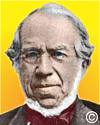
On 24 Jun 1788, Thomas Blanchard was born, an American inventor who made major contributions to the development of machine tools and invented a number of machines including the famous lathe that bears his name. At age 13, he developed an apple-paring machine, and later he devised a machine to mass-produce tacks without the tedious handwork of heading the tack.
This article from A History of American Manufactures from 1608 to 1860 (1866) gives some more information on his inventiveness.

On 24 Jun 1915, Fred Hoyle was born, an English mathematician and astronomer, who coined the term "Big Bang" as a derisive reference to the theory in which he did not believe. He supported a different theory for the origins of the universe. Today's book pick is: A Different Approach to Cosmology: From a Static Universe through the Big Bang towards Reality, by F. Hoyle, G. Burbidge, J. V. Narlikar. They present the best-developed alternative theory to the “Big Bang,” with scientific arguments written to be accessible to upper-division undergraduate students in physics and astrophysics. According to Physics Today, “This is a fascinating book, expressing the views of three scientists who choose to go against the conventional cosmological wisdom. It is extremely important for such skepticism to exist and for such books to be written.”
It is available from Amazon, typically about New from $133.87. Used from $20.31. (As of earlier time of writing - subject to change.)
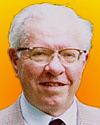 | It is often held that scientific hypotheses are constructed, and are to be constructed, only after a detailed weighing of all possible evidence bearing on the matter, and that then and only then may one consider, and still only tentatively, any hypotheses. This traditional view however, is largely incorrect, for not only is it absurdly impossible of application, but it is contradicted by the history of the development of any scientific theory. What happens in practice is that by intuitive insight, or other inexplicable inspiration, the theorist decides that certain features seem to him more important than others and capable of explanation by certain hypotheses. Then basing his study on these hypotheses the attempt is made to deduce their consequences. The successful pioneer of theoretical science is he whose intuitions yield hypotheses on which satisfactory theories can be built, and conversely for the unsuccessful (as judged from a purely scientific standpoint). |
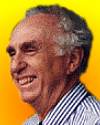 | My final remark to young women and men going into experimental science is that they should pay little attention to the speculative physics ideas of my generation. After all, if my generation has any really good speculative ideas, we will be carrying these ideas out ourselves. |
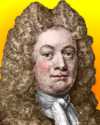 | He who cures a disease may be the skillfullest, but he who prevents it is the safest physician. |
| Before you look at today's web page, see if you can answer some of these questions about the events that happened on this day. Some of the names are very familiar. Others will likely stump you. Tickle your curiosity with these questions, then check your answers on today's web page. | |
| Births | |
 | Martin Lewis Perl, born 24 Jun 1927, won the 1995 Nobel Prize for Physics for discovering a subatomic particle (in the mid-1970s) which was a massive lepton with a negative charge, the first evidence of a third “generation” of fundamental particles. What did he name this particle? |
 | On 24 Jun 1915, Sir Fred Hoyle was born, an English mathematician and astronomer. He became Britain’s best-known astronomer in 1950 with his broadcast lectures on The Nature of the Universe, and he recalled coining the term “Big Bang” in the last of those talks. Even so, Hoyle never accepted the now most popular “Big Bang” theory for the origin of the universe. What theory for the universe did Hoyle promote? |
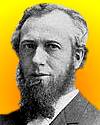 | On 24 Jun 1839, Gustavus Swift was born, who was a partner in a Chicago meat company when he invented a way to handle the supply of beef from western states to Chicago. His method made it no longer necessary to keep the animals alive for slaughter in Chicago. It was so successful he formed Swift and Company with his brother. He also pioneered products such as glue, soap and margarine to profit from animal parts previously discarded. His alliances with J.O. Armour and Edward Morris formed such a monopoly that the “Beef Trust” was broken up by the Supreme Court in 1905. What was the invention with which he revolutionized the handling of the beef supply to Chicago from western states? |
| Deaths | |
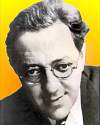 | Willy Ley (1906-1969) was a German-American engineer who was a founder of the German Rocket Society. The society was the first group of men (with the sole exception of Robert Goddard) to experiment with rockets. Ley was consultant for the science fiction film Frau im Mond in which the countdown from ten to zero was introduced. Fiercely anti-Nazi, in 1934, he emigrated to the U.S. rather than pursuing military applications of rocketry. In the U.S., he became a popularizer of space exploration and travel, writing many popular books. Can you name the man Lay introduced to the society who is the best known German to conduct rocket experiments during World War II? |
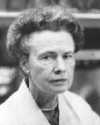 | Hattie Elizabeth Alexander died on 24 Jun 1968. She was an American who did groundbreaking work in her field, publishing some 70 papers over a period of 30 years. Can you name the profession in which this lady made significant advances, and what they were? |
| Events | |
 | In 1873, a well-known American author received a U.S. patent for a self-pasting Scrapbook (No. 140245). His invention was to coat the pages of the scrapbook with mucilage or adhesive. He suggested two forms. In one form, the pages would be coated within patches of adhesive with intervals of untreated paper between them. The second form was to coat the entire page. In either case, only sufficient area of the leaf is moistened that is necessary to hold the piece that is to be pasted in. Can you name this inventor and his author pen-name? |
 | On 24 Jun of a certain year, a home video recorder was first demonstrated at the BBC News Studios in London. The Telcan machine was a fixed-head longitudinal videotape recorder intended for home-taping of television programmes. The open-reel recorder mounted on top of a television cabinet used quarter-inch tape running at 120 inches per second speed. Telcan failed before it ever went on sale. In what decade did this demonstration take place? |
 | In 1975, a moon tremor was detected by the seismometer network left on the Moon’s surface by American astronauts. What was the cause of this tremor? |
Fast answers for the previous newsletter for June 23: 100,000 years • plane polarized • Jonas Edward Salk • -117 °F (-82.8 °C) • the decade including the year 1964.
 If you enjoy this newsletter, the website, or wish to offer encouragement or ideas, please send feedback by using your mail reader Reply button.
If you enjoy this newsletter, the website, or wish to offer encouragement or ideas, please send feedback by using your mail reader Reply button. Your click on a Facebook, StumbleUpon, or other social button on the site webpages is also a welcome sign of appreciation. Thank you for using them.
© This newsletter is copyright 2020 by todayinsci.com. Please respect the Webmaster's wishes and do not put copies online of the Newsletter — or any Today in Science History webpage. (If you already have done so, please remove them. Thank you.) Offline use in education is encouraged such as a printout on a bulletin board, or projected for classroom viewing. Online, descriptive links to our pages are welcomed, as these will provide a reader with the most recent revisions, additions and/or corrections of a webpage. For any other copyright questions, please contact the Webmaster by using your mail reader Reply button.
--
If you do not want to receive any more newsletters, Unsubscribe
To update your preferences and to unsubscribe visit this link
Executive Real Estate Business Class
-
"It was like a man with wings. It wasn't like anything you'd see on TV or in a monster movie." ...
About the publisher
Search This Blog
Blog Archive
-
▼
2021
(585)
-
▼
June
(64)
- On This Day for June 30 - Night of the Long Knives...
- Newsletter for Wednesday 30 June.
- On This Day for June 29 - London's Globe Theatre d...
- Newsletter for Tuesday 29 June.
- On This Day for June 28 - Assassination of Archduk...
- Newsletter for Monday 28 June.
- On This Day for June 27 - Yen made official moneta...
- Newsletter for Sunday 27 June.
- On This Day for June 26 - Opening of CN Tower, Bab...
- Newsletter for Saturday 26 June.
- On This Day for June 25 - Korean War begun, Antoni...
- Newsletter for Friday 25 June.
- On This Day for June 24 - Russia invaded by Napole...
- Newsletter for Thursday 24 June.
- On This Day for June 23 - Battle of Bannockburn, C...
- Newsletter for Wednesday 23 June.
- On This Day for June 22 - Mutiny against Henry Hud...
- Newsletter for Tuesday 22 June.
- On This Day for June 21 - Japanese forces defeated...
- Newsletter for Monday 21 June.
- On This Day for June 20 - Casket Letters found, Ho...
- Newsletter for Sunday 20 June.
- Tonight at 8/7c: Watch ‘Fight the Power’
- On This Day for June 19 - Rosenbergs executed for ...
- Newsletter for Saturday 19 June.
- On This Day for June 18 - War of 1812 begun, Sir P...
- Newsletter for Friday 18 June.
- On This Day for June 17 - Arrest of O.J. Simpson, ...
- Newsletter for Thursday 17 June.
- On This Day for June 16 - First woman in space, Jo...
- Newsletter for Wednesday 16 June.
- On This Day for June 15 - Magna Carta sealed by Ki...
- Newsletter for Tuesday 15 June.
- On This Day for June 14 - First prisoners at Ausch...
- Newsletter for Monday 14 June.
- On This Day for June 13 - Historic meeting between...
- Newsletter for Sunday 13 June.
- On This Day for June 12 - Election of Boris Yeltsi...
- Newsletter for Saturday 12 June.
- Listen Now! Blindspot: Tulsa Burning Podcast
- On This Day for June 11 - Oklahoma City bomber exe...
- Newsletter for Friday 11 June.
- On This Day for June 10 - First “witch” hanged in ...
- Newsletter for Thursday 10 June.
- On This Day for June 9 - Landslide reelection vict...
- Newsletter for Wednesday 9 June.
- On This Day for June 8 - Michelangelo's David inst...
- Newsletter for Tuesday 8 June.
- Action required: Update your HistoryExtra password
- On This Day for June 7 - Lateran Treaty ratified, ...
- Newsletter for Monday 7 June.
- On This Day for June 6 - Normandy Invasion begun, ...
- Newsletter for Sunday 6 June.
- On This Day for June 5 - Start of the Six-Day War,...
- Newsletter for Saturday 5 June.
- On This Day for June 4 - Dunkirk evacuation ended,...
- Newsletter for Friday 4 June.
- Tonight: ‘Alone’ Returns at 9:30/8:30c
- On This Day for June 3 - Pro-democracy protest in ...
- Newsletter for Thursday 3 June.
- On This Day for June 2 - Elizabeth II crowned quee...
- Newsletter for Wednesday 2 June.
- On This Day for June 1 - Debut of CNN, Morgan Free...
- Newsletter for Tuesday 1 June.
-
▼
June
(64)
-
Blogroll
-
About
HistoryFact










0 comments:
Post a Comment